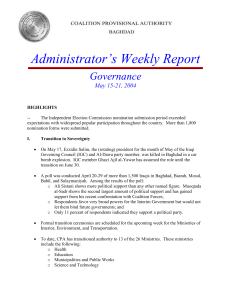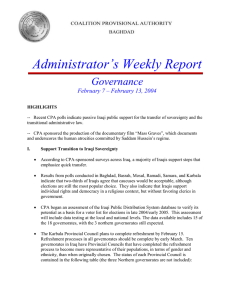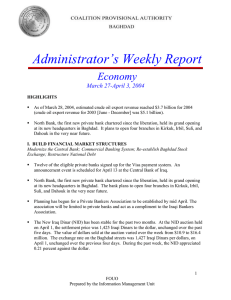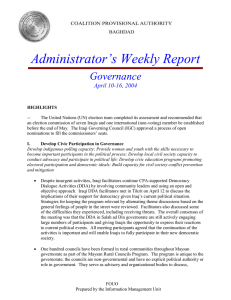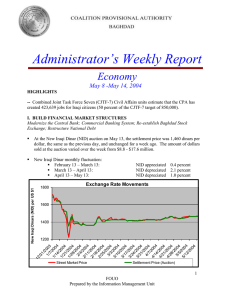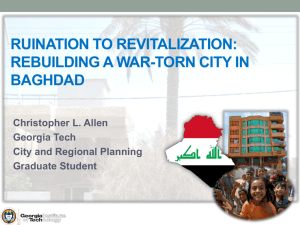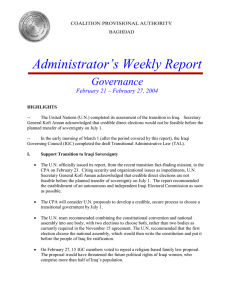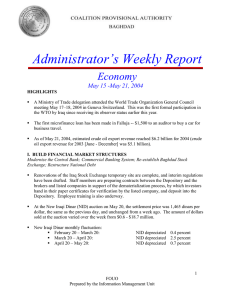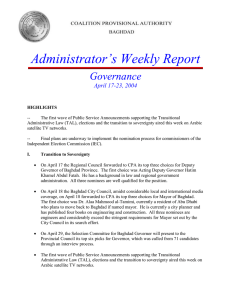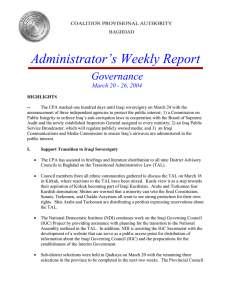Administrator’s Weekly Report Governance April 3-9, 2004
advertisement
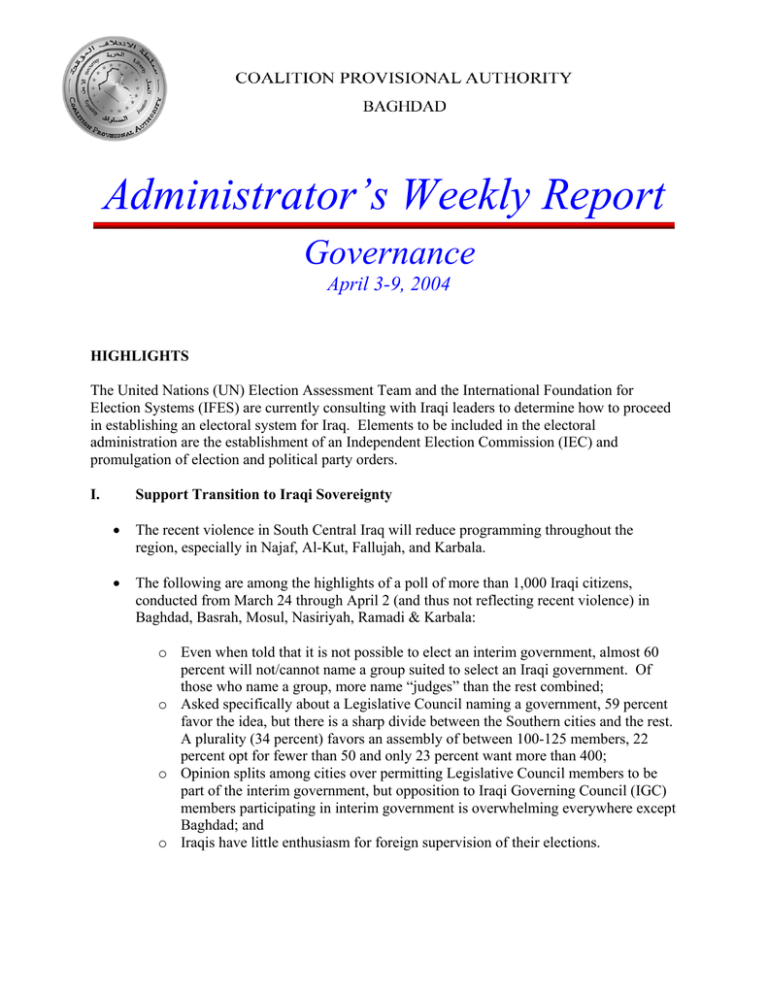
Administrator’s Weekly Report Governance April 3-9, 2004 HIGHLIGHTS The United Nations (UN) Election Assessment Team and the International Foundation for Election Systems (IFES) are currently consulting with Iraqi leaders to determine how to proceed in establishing an electoral system for Iraq. Elements to be included in the electoral administration are the establishment of an Independent Election Commission (IEC) and promulgation of election and political party orders. I. Support Transition to Iraqi Sovereignty • The recent violence in South Central Iraq will reduce programming throughout the region, especially in Najaf, Al-Kut, Fallujah, and Karbala. • The following are among the highlights of a poll of more than 1,000 Iraqi citizens, conducted from March 24 through April 2 (and thus not reflecting recent violence) in Baghdad, Basrah, Mosul, Nasiriyah, Ramadi & Karbala: o Even when told that it is not possible to elect an interim government, almost 60 percent will not/cannot name a group suited to select an Iraqi government. Of those who name a group, more name “judges” than the rest combined; o Asked specifically about a Legislative Council naming a government, 59 percent favor the idea, but there is a sharp divide between the Southern cities and the rest. A plurality (34 percent) favors an assembly of between 100-125 members, 22 percent opt for fewer than 50 and only 23 percent want more than 400; o Opinion splits among cities over permitting Legislative Council members to be part of the interim government, but opposition to Iraqi Governing Council (IGC) members participating in interim government is overwhelming everywhere except Baghdad; and o Iraqis have little enthusiasm for foreign supervision of their elections. • The same poll indicated that public understanding of the TAL is poor. The following two charts indicate that among the 56 percent of respondents who say they have heard something about the law, the most popular provision of the TAL is freedom of expression (12 percent); the least popular is federalism (17 percent). Source: IIACSS April 2004 2 FOUO Prepared by the Information Management Unit II. Develop Civic Participation in Governance Develop indigenous polling capacity; Provide women and youth with the skills necessary to become important participants in the political process; Develop local civil society capacity to conduct advocacy and participate in political life; Develop civic education programs promoting electoral participation and democratic ideals; Build capacity for civil society conflict prevention and mitigation • As the first step toward developing a women's network that stretches across many parties and civil society organizations, the National Democratic Institute (NDI) facilitated a series of public speaking workshops for women. Before the training had to be cancelled due to security concerns, 28 women were trained over three days, including political activists, party officials, journalists and a city councilor. • The CPA provided funding to the Kurdistan Institute for Elections to conduct women's rights awareness courses in three rural areas of Sulaymaniyah. The award will fund sixteen courses that will focus on women's rights, discrimination and violence. Women throughout Iraq have been deprived of the right to lead a healthy and civilized life and have encountered many forms of violence. Discrimination, abuse and violence are even more prevalent in the rural areas. This grant proposes to target men and women, raising the awareness of women's rights and focusing on issues of discrimination and violence. • CPA officials met with the leadership of the Future Society for Iraqi Women to discuss their future plans for ensuring women's political participation and the proposals that the group is planning on submitting. Some members are interested both in the Candidate Training that NDI is offering and CPA-sponsored media training. • Twenty women leaders from around the country met in Baghdad on April 6 with United Nations representative Ambassador Lakhdar Brahimi to discuss women's roles in the new democratic processes and institutions in Iraq. The discussion focused on the next three stages of the transition, the goal of 25 percent of government seats for women, and the role of political parties. • CPA officials met with the members of the Women's Alliance for Democracy in Iraq in Baghdad on April 8 to review their group's goals and proposal for candidacy and advocacy training for women. OWA recommended several ways to utilize existing resources in the area, including sessions with IFES, NDI, IRI, and Strategic Communications and suggested too that they contact the Iraq Foundation to see if there were any possibilities of resource sharing (as they are also developing an advocacy training course). • The CPA continues to support and facilitate the implementation of CPA’s Democracy Dialogue Activity (DDA) as part of the National Civic Dialogue Program (CDP). More than 1,100 DDA events took place this week, although the overwhelming majority of activities took place in the North. DDA facilitators promote open discussions on 3 FOUO Prepared by the Information Management Unit democratic themes such as elections, and political party systems among Iraqi men, women, and youth in preparation for the transition to sovereignty. • In the culmination of a week-long public selection process, the Ninewa Provincial Council selected Dr. Oussama Kashmoula the new governor of the province on April 5. After the resignation of former Governor Ghanem Al Basso on March 29, CPA-Ninewa and the Provincial Council agreed upon a selection method for the position based on a list of criteria. The Provincial Council interviewed 39 candidates and selected three for the final vote. After the three candidates conducted a televised public debate, the Provincial Council voted 25-7 for Kashmoula. • On April 3, the CPA hosted Mr. Atta Abd Alwahab, Deputy to Governing Council member Mr. Adnan Al-Pachachi, in a panel discussion for facilitators of the Civic Dialogue Program and other invited guests. This discussion was the second in the “Saturday Series of Democracy Dialogues” that CPA is sponsoring in Baghdad. Mr. Alwahab discussed the status quo in Iraq and its effects on democracy and reviewed the events relating to the establishment of the Governing Council and the upcoming transition on June 30. Mr. Alwahab ended his presentation stating, "We seek to end the occupation and find a new democracy in Iraq." • On April 3, 51 Iraqis, including nine women, participated in the final in a series of seven conferences on Arbil Governorate economic development at Salah ad Din University. Discussions focused on strengthening institutions to enable the governorate to become an active participant in the global economy. • From March 31 to April 5, 17 local government officials, including four Governorate Council members, participated in training in Kirkuk on the tools and strategies of how to increase transparency with regard to the media, civil society organizations, and citizens. Specifically, the sessions addressed how to field questions and develop effective responses to media attention. Trainees had the opportunity to see themselves on camera as they responded to mock interview questions by a member of the media. III. Develop Framework and Capacity for Elections Support creation of National Independent Electoral Commission; Promote Scopes of work and Operational Linkages between national, regional, and local level election administration authorities • The United Nations (UN) Election Assessment Team and the International Foundation for Election Systems (IFES) are currently consulting with Iraqi leaders to determine how to proceed in establishing an electoral system for Iraq. Elements to be included in the electoral administration are the establishment of an Independent Election Commission (IEC) and promulgation of election and political party orders. 4 FOUO Prepared by the Information Management Unit IV. Support Development of Sustainable Political Parties/Associations Support development of political associations • The National Democratic Institute (NDI) hosted training in voter targeting, message development, voter contact and coalition building in Baghdad on April 4. Of the 24 participants that attended the session, six were women. Some party members were Christian, and many spoke very good English, suggesting a party base that is urban, secular and well-educated. Islamic Democratic Trend members were very engaged and easily grasped the new ideas. Applying the concepts to the party platform may prove difficult, however. Participants grappled with the challenge of making the party's central message, that "Islam and democracy are compatible," relevant for voters with everyday concerns. V. Promote Respect for Human Rights Educate on Human Rights Issues; Preserve documentation of past atrocities, raise awareness, and promote reconciliation; Strengthen local capacity to investigate and address past atrocities; Establish Iraqi Special Tribunal (IST) for past atrocities; Incorporate Human Rights into laws; Develop role of independent human rights NGOs and media; Establish a Human Rights Ministry • The Iraqi Special Tribunal was established by the IGC to bring former Ba'athist regime officials to justice for war crimes and crimes against humanity. Grants from CPA (USAID Office of Transition Initiative) will help develop the capacity of the tribunal to conduct these trials in a fair and efficient manner, consistent with international human rights standards. The first grant will provide equipment to convert evidence to electronic form, allowing it to be more easily searched, analyzed, and protected. The second award will furnish and equip offices for the investigative and prosecutorial staff of the tribunal. VI. Promote Durable Solutions for Refugees and Internally Displaced Persons (IDPs) Facilitate the return of refugees and IDPs; Build local and national capacity to protect and assist refugees and IDPs; Develop and implement the Iraq Property Claims Commission (IPCC) for property disputes • IPCC offices are now open in Baghdad, Mosul, and Sulimaniyah. Security issues have caused delays in opening offices in Najaf, Karbala, Al-Kut, Anbar and most of central Iraq. In the south, CPA continues efforts to open offices by late April, but security is an issue in this region also. The IPCC national information campaign has been delayed pending the appointment of the IPCC spokesperson. Until then, regional locations are continuing education of the public on the role of the IPCC in property restitution. 5 FOUO Prepared by the Information Management Unit


